ASP.NET CORE API Swagger+IdentityServer4授权验证
简介
本来不想写这篇博文,但在网上找到的文章博客都没有完整配置信息,所以这里记录下。
不了解IdentityServer4的可以看看我之前写的入门博文
Swagger 官方演示地址
配置IdentityServer4服务端
首先创建一个新的ASP.NET Core项目。
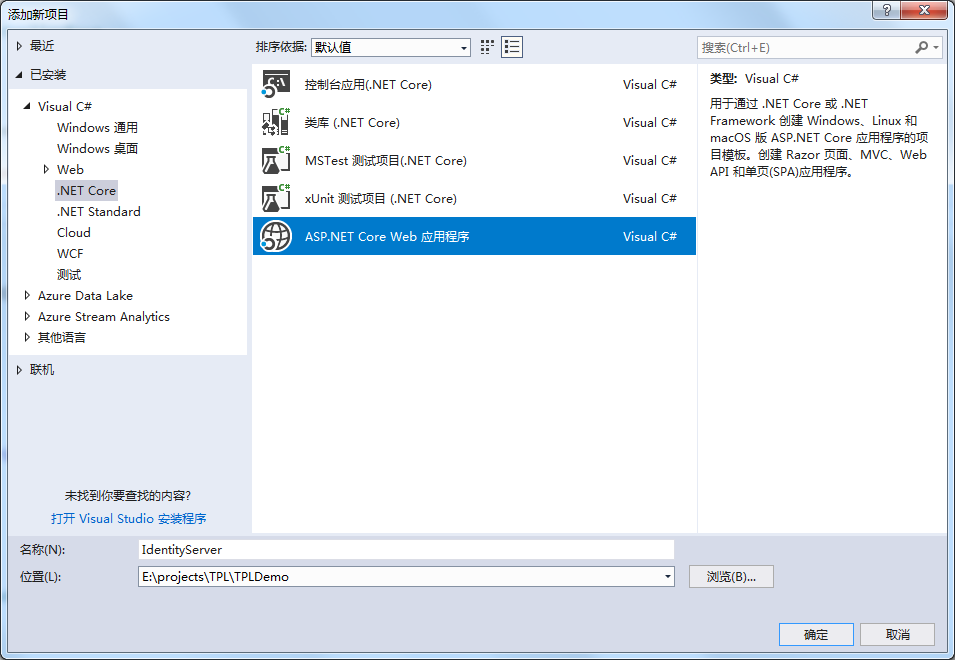
这里选择空白项,新建空白项目
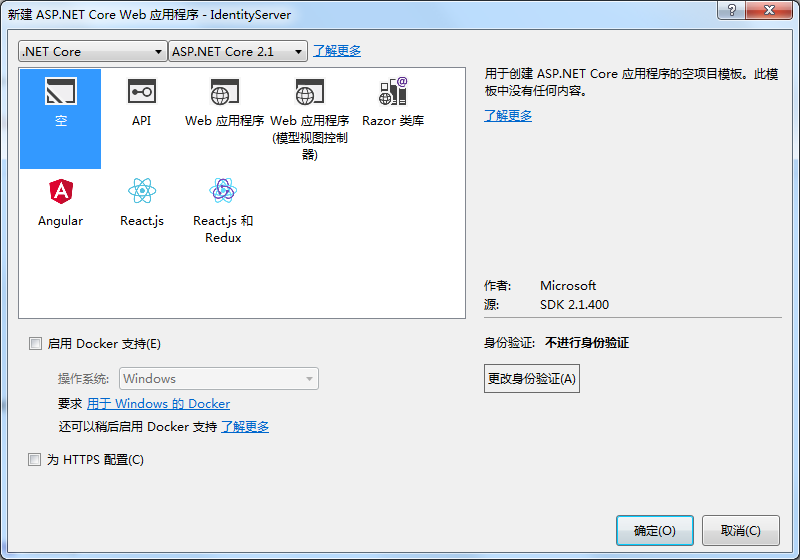
等待创建完成后,右键单击项目中的依赖项选择管理NuGet程序包,搜索IdentityServer4并安装:
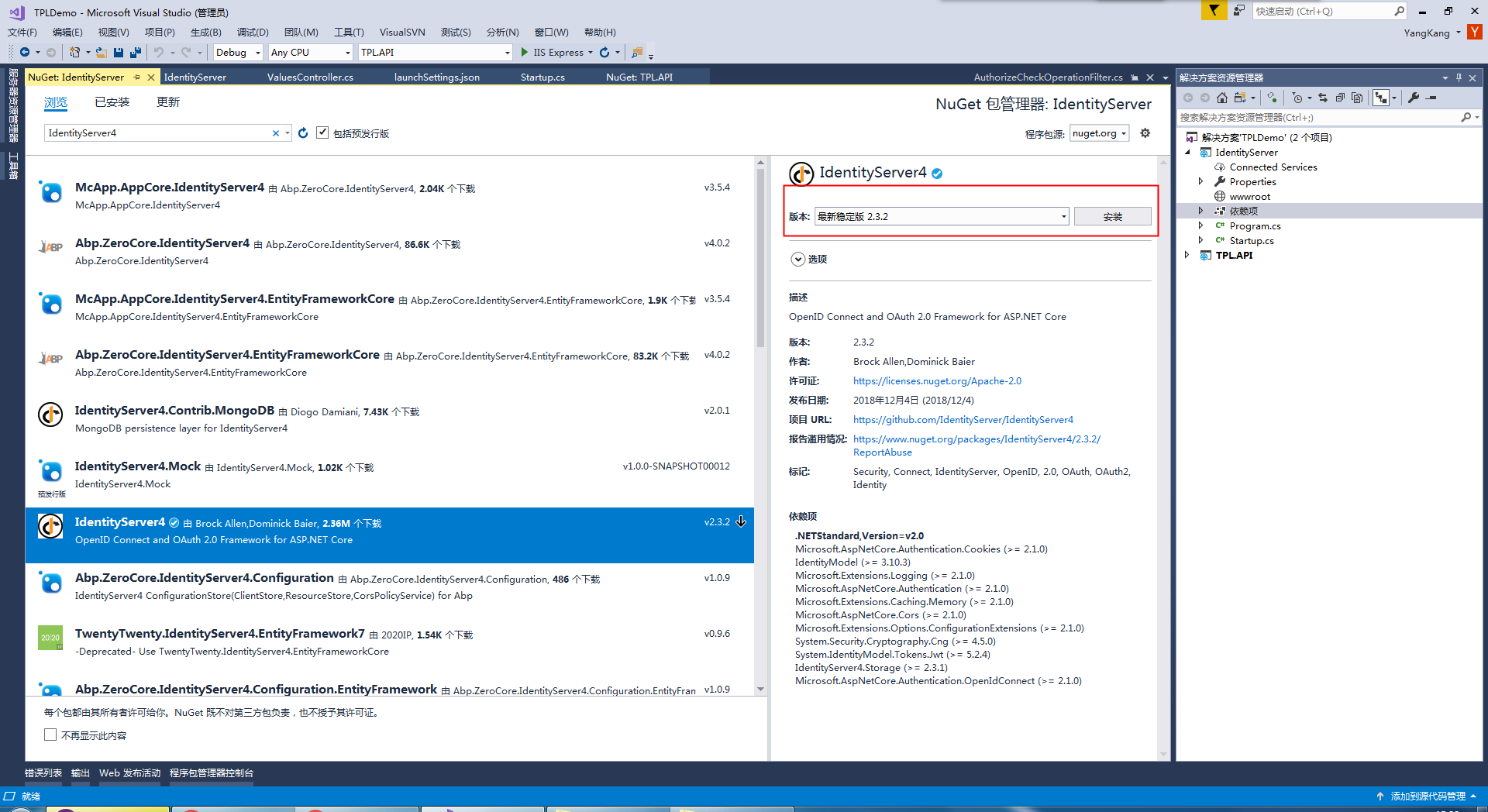
等待安装完成后,下载官方提供的UI文件,并拖放到项目中。下载地址:https://github.com/IdentityServer/IdentityServer4.Quickstart.UI
配置IdentityServer4
在项目中新建文件Config.cs文件,源码如下:
using IdentityServer4; using IdentityServer4.Models; using IdentityServer4.Test; using System; using System.Collections.Generic; using System.Linq; using System.Threading.Tasks; namespace IdentityServer { public static class Config { public static IEnumerable<IdentityResource> GetIdentityResources() { return new IdentityResource[] { new IdentityResources.OpenId(), new IdentityResources.Profile(), }; } /// <summary> /// API信息 /// </summary> /// <returns></returns> public static IEnumerable<ApiResource> GetApis() { return new[] { new ApiResource("demo_api", "Demo API with Swagger") }; } /// <summary> /// 客服端信息 /// </summary> /// <returns></returns> public static IEnumerable<Client> GetClients() { return new[] { new Client { ClientId = "demo_api_swagger",//客服端名称 ClientName = "Swagger UI for demo_api",//描述 AllowedGrantTypes = GrantTypes.Implicit,//指定允许的授权类型(AuthorizationCode,Implicit,Hybrid,ResourceOwner,ClientCredentials的合法组合)。 AllowAccessTokensViaBrowser = true,//是否通过浏览器为此客户端传输访问令牌 RedirectUris = { "http://localhost:5001/swagger/oauth2-redirect.html" }, AllowedScopes = { "demo_api" }//指定客户端请求的api作用域。 如果为空,则客户端无法访问 } }; } } }
打开Startup.cs文件配置,修改如下:
using System; using System.Collections.Generic; using System.Linq; using System.Threading.Tasks; using IdentityServer4.Quickstart.UI; using Microsoft.AspNetCore.Builder; using Microsoft.AspNetCore.Hosting; using Microsoft.AspNetCore.Http; using Microsoft.AspNetCore.Mvc; using Microsoft.Extensions.DependencyInjection; namespace IdentityServer { public class Startup { // This method gets called by the runtime. Use this method to add services to the container. // For more information on how to configure your application, visit https://go.microsoft.com/fwlink/?LinkID=398940 public void ConfigureServices(IServiceCollection services) { services.AddMvc().SetCompatibilityVersion(CompatibilityVersion.Version_2_1); //配置身份服务器与内存中的存储,密钥,客户端和资源 services.AddIdentityServer() .AddDeveloperSigningCredential() .AddInMemoryApiResources(Config.GetApis())//添加api资源 .AddInMemoryClients(Config.GetClients())//添加客户端 .AddInMemoryIdentityResources(Config.GetIdentityResources())//添加对OpenID Connect的支持 .AddTestUsers(TestUsers.Users); //添加测试用户 } // This method gets called by the runtime. Use this method to configure the HTTP request pipeline. public void Configure(IApplicationBuilder app, IHostingEnvironment env) { if (env.IsDevelopment()) { app.UseDeveloperExceptionPage(); } //IdentityServe app.UseIdentityServer(); //添加静态资源访问 app.UseStaticFiles(); // app.UseMvcWithDefaultRoute(); } } }
修改启动端口为5000,启动访问:http://localhost:5000/,效果如下:
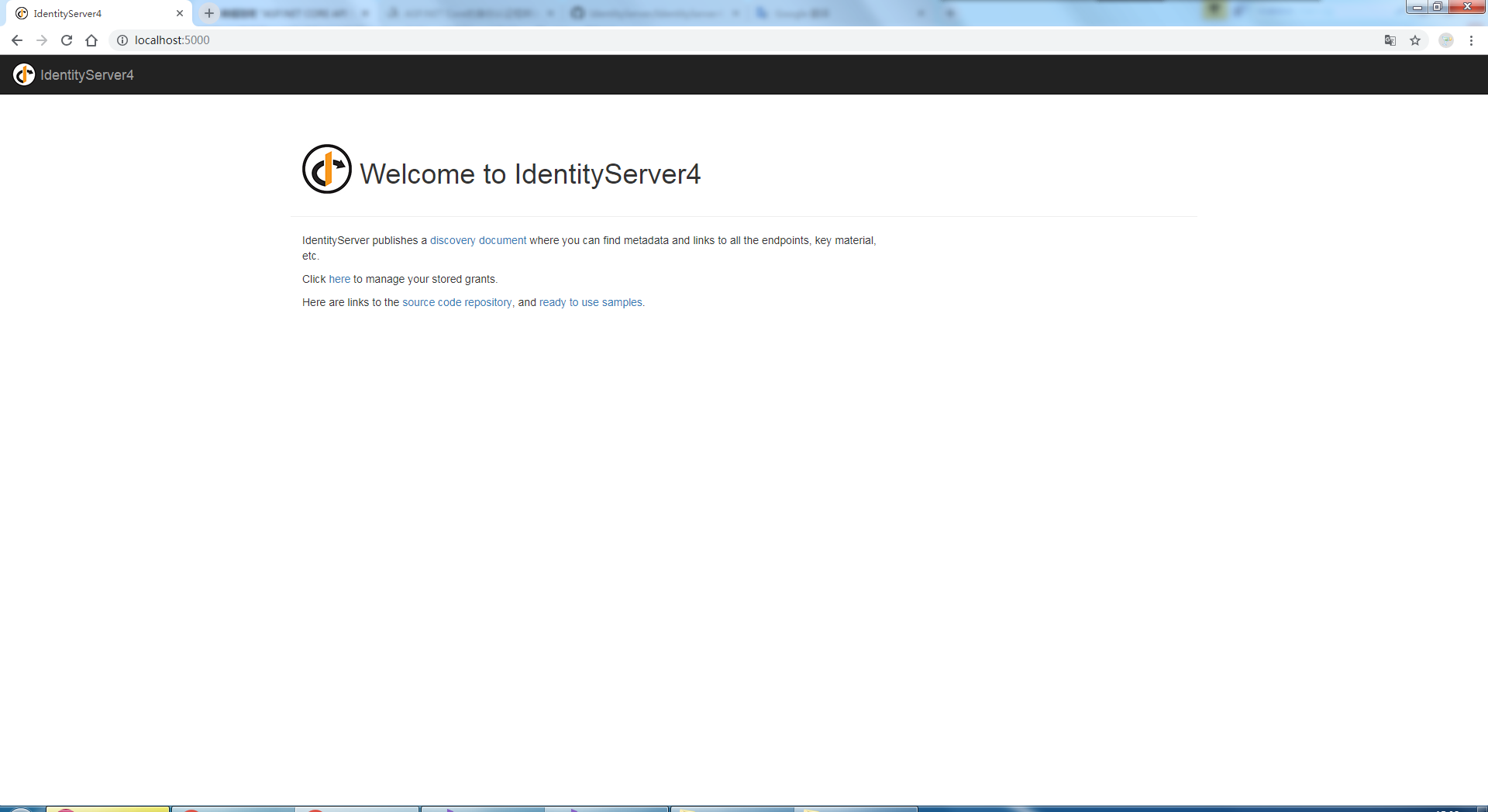
API配置
新建ASP.NET CORE API项目,使用NuGet添加包:IdentityServer4.AccessTokenValidation、Swashbuckle.AspNetCore

在API中添加 AuthorizeCheckOperationFilter用于管理IdentityServer4认证处理,代码如下:
using Microsoft.AspNetCore.Authorization; using Swashbuckle.AspNetCore.Swagger; using Swashbuckle.AspNetCore.SwaggerGen; using System; using System.Collections.Generic; using System.Linq; using System.Threading.Tasks; namespace TPL.API { /// <summary> /// IdentityServer4认证过滤器 /// </summary> public class AuthorizeCheckOperationFilter : IOperationFilter { public void Apply(Operation operation, OperationFilterContext context) { //获取是否添加登录特性 var authAttributes = context.MethodInfo.DeclaringType.GetCustomAttributes(true) .Union(context.MethodInfo.GetCustomAttributes(true)) .OfType<AuthorizeAttribute>().Any(); if (authAttributes) { operation.Responses.Add("401", new Response { Description = "暂无访问权限" }); operation.Responses.Add("403", new Response { Description = "禁止访问" }); //给api添加锁的标注 operation.Security = new List<IDictionary<string, IEnumerable<string>>> { new Dictionary<string, IEnumerable<string>> {{"oauth2", new[] {"demo_api"}}} }; } } } }
修改API的Startup文件,修改如下:
using System; using System.Collections.Generic; using IdentityServer4.AccessTokenValidation; using Microsoft.AspNetCore.Builder; using Microsoft.AspNetCore.Hosting; using Microsoft.AspNetCore.Mvc; using Microsoft.Extensions.Configuration; using Microsoft.Extensions.DependencyInjection; using Swashbuckle.AspNetCore.Swagger; namespace TPL.API { public class Startup { public Startup(IConfiguration configuration) { Configuration = configuration; } public IConfiguration Configuration { get; } // This method gets called by the runtime. Use this method to add services to the container. public void ConfigureServices(IServiceCollection services) { services.AddMvc().SetCompatibilityVersion(CompatibilityVersion.Version_2_1); //用户校验 services.AddAuthentication(IdentityServerAuthenticationDefaults.AuthenticationScheme) .AddIdentityServerAuthentication(options => { options.Authority = "http://localhost:5000"; // IdentityServer服务器地址 options.ApiName = "demo_api"; // 用于针对进行身份验证的API资源的名称 options.RequireHttpsMetadata = false; // 指定是否为HTTPS }); //添加Swagger. services.AddSwaggerGen(options => { options.SwaggerDoc("v1", new Info { Title = "Protected API", Version = "v1" }); //向生成的Swagger添加一个或多个“securityDefinitions”,用于API的登录校验 options.AddSecurityDefinition("oauth2", new OAuth2Scheme { Flow = "implicit", // 只需通过浏览器获取令牌(适用于swagger) AuthorizationUrl = "http://localhost:5000/connect/authorize",//获取登录授权接口 Scopes = new Dictionary<string, string> { { "demo_api", "Demo API - full access" }//指定客户端请求的api作用域。 如果为空,则客户端无法访问 } }); options.OperationFilter<AuthorizeCheckOperationFilter>(); // 添加IdentityServer4认证过滤 }); } // This method gets called by the runtime. Use this method to configure the HTTP request pipeline. public void Configure(IApplicationBuilder app, IHostingEnvironment env) { if (env.IsDevelopment()) { app.UseDeveloperExceptionPage(); } app.UseAuthentication(); // Swagger JSON Doc app.UseSwagger(); // Swagger UI app.UseSwaggerUI(options => { options.SwaggerEndpoint("/swagger/v1/swagger.json", "My API V1"); options.OAuthClientId("demo_api_swagger");//客服端名称 options.OAuthAppName("Demo API - Swagger-演示"); // 描述 }); app.UseMvc(); } } }
修改Properties文件夹下的launchSettings启动端口为5001,这里端口必须跟IdentityServer4中的Config配置的客服端资源中保持一致。
{ "$schema": "http://json.schemastore.org/launchsettings.json", "iisSettings": { "windowsAuthentication": false, "anonymousAuthentication": true, "iisExpress": { "applicationUrl": "http://localhost:5001", "sslPort": 0 } }, "profiles": { "IIS Express": { "commandName": "IISExpress", "launchBrowser": true, "launchUrl": "swagger", "environmentVariables": { "ASPNETCORE_ENVIRONMENT": "Development" } }, "TPL.API": { "commandName": "Project", "launchBrowser": true, "launchUrl": "swagger", "applicationUrl": "http://localhost:5001", "environmentVariables": { "ASPNETCORE_ENVIRONMENT": "Development" } } } }
访问呈现效果如下,从中效果图中可以看出添加登录按钮,API控制器中如果添加Authorize特性,对应接口会有一把锁的标志:
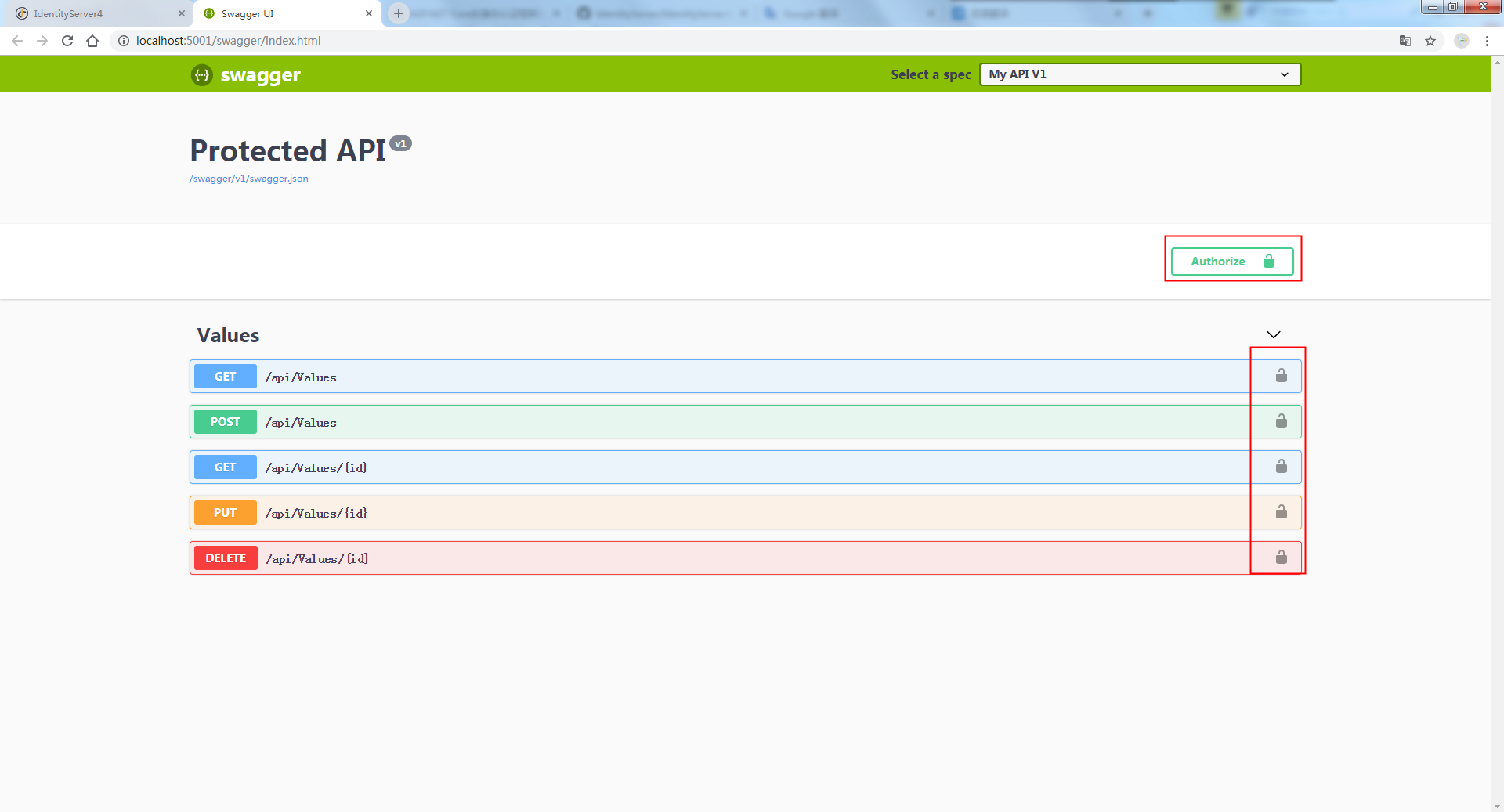
如果未授权访问接口返回401,未授权提示:
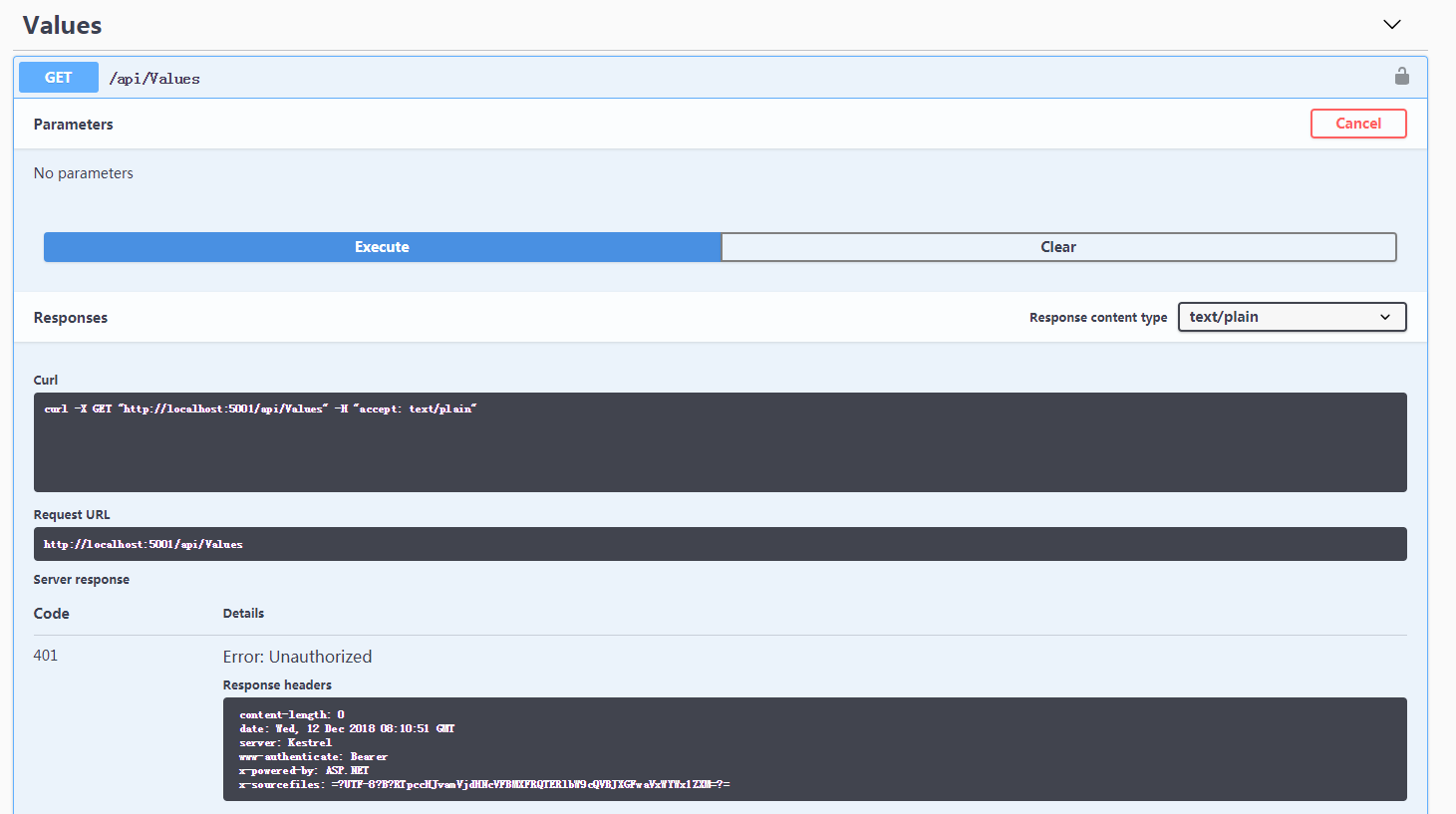
点击Authorize按钮会跳转到IdentityServer4登录页面,登录授权成功后会自动获取登录后服务器返回Token,再次访问接口即可正常访问,授权前后效果如下:
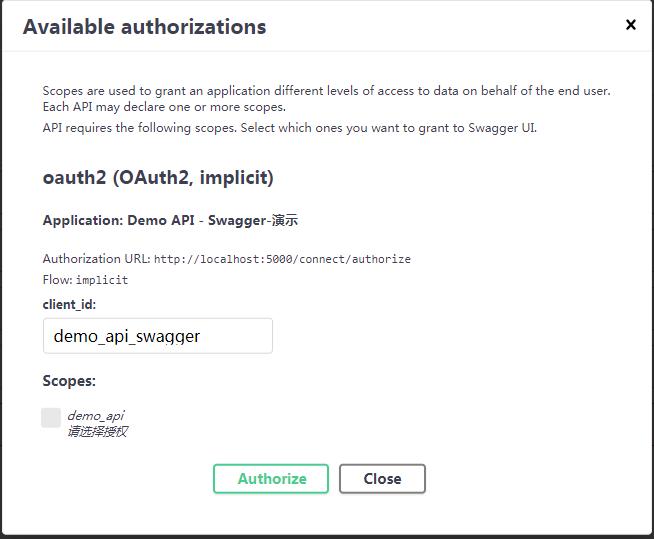
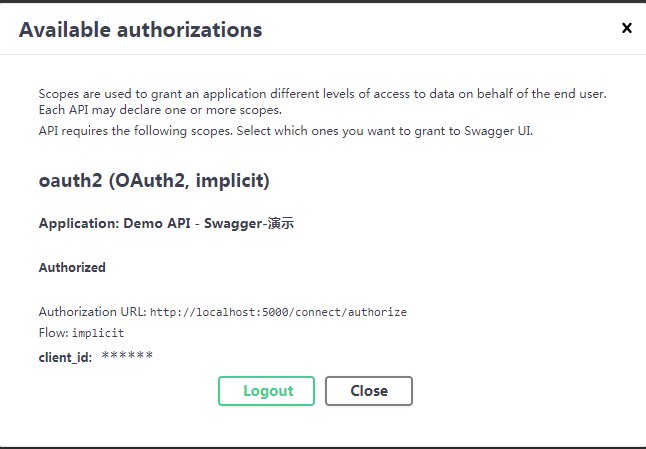
到此演示项目完毕。如果需求配合自己的数据库使用请看我前面写过的博文 自定义登录即可。




【推荐】编程新体验,更懂你的AI,立即体验豆包MarsCode编程助手
【推荐】凌霞软件回馈社区,博客园 & 1Panel & Halo 联合会员上线
【推荐】抖音旗下AI助手豆包,你的智能百科全书,全免费不限次数
【推荐】博客园社区专享云产品让利特惠,阿里云新客6.5折上折
【推荐】轻量又高性能的 SSH 工具 IShell:AI 加持,快人一步